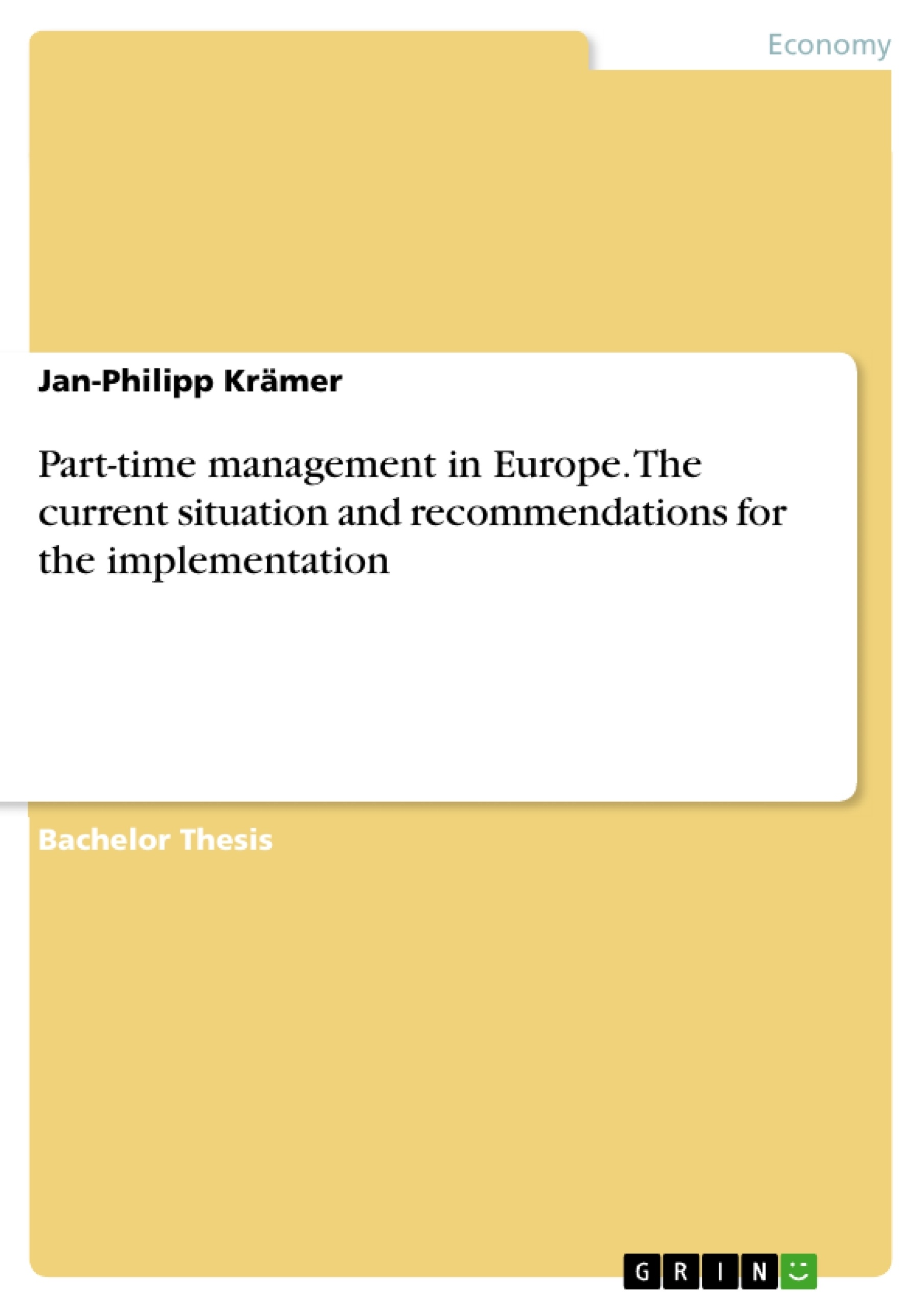For decades it has been known now what the future demographic development will be like and what radical impact it will leave on the employment structure of companies. Nevertheless, no proper responses have been made by companies to motivate, on the one hand, the Generation Y employees and, on the other hand, women to take over more responsibility and occupy a management position. One of the most important job specifications for the Generation Y and women, however, is the so called work-life balance, so employers must use work-life balance issues as incentives in recruiting.
As a consequence, this thesis correlates both topics and investigates the applicability of the concept of part-time work on the management level. In so doing, the specific focus on managers was chosen due to the fact that companies have a great interest in forming a lasting bond with this kind of highly qualified specialists and, therefore, are required to take better account of their needs regarding the working time management. Furthermore, reductions in working time at management level can help the labour market to reduce the gender segregation by attracting more women to top positions.
The crux of the thesis will therefore be to investigate the practicability of part-time management and to solve the following question: How does the current situation of part-time managers in Europe look like and what should companies do for a successful implementation?
Inhaltsverzeichnis (Table of Contents)
- 1. Introduction
- 2. Definition and explanation of key terms
- 2.1 Management
- 2.2 Part-time employment
- 2.3 Chapter summary
- 3. Current situation in Europe
- 3.1 Germany
- 3.2 The Netherlands
- 3.3 Switzerland
- 3.4 Rise of Generation Y
- 3.5 Demand and satisfaction of managerial part-time work
- 3.6 Chapter summary
- 4. Implementation
- 4.1 Reasons for exploiting part-time employment
- 4.2 Best practice example: The German insurance company HUK-Coburg
- 4.3 Models of part-time work
- 4.3.1 Job sharing
- 4.3.2 Cadre model
- 4.3.3 Reduced working days
- 4.4 Obstacles of part-time work and corresponding solutions
- 4.5 Success factors and recommendations
- 4.6 Chapter summary
- 5. Conclusion
Zielsetzung und Themenschwerpunkte (Objectives and Key Themes)
This thesis investigates the applicability of part-time work on the management level in Europe, focusing on the current situation and recommendations for successful implementation. It aims to analyze the current situation of part-time managers in Europe and provide recommendations for companies to successfully implement part-time management alternatives for their employees. The thesis examines the difference between full-time and part-time managers and takes stock of the current situation in part-time management, particularly in Germany, the Netherlands, and Switzerland.
- The growing importance of work-life balance for employees, especially Generation Y and women.
- The impact of demographic changes and the need for companies to attract and retain qualified professionals.
- The benefits and challenges of part-time management, including its potential to reduce gender segregation in leadership positions.
- The practical implementation of part-time management models, including job sharing, cadre models, and reduced working days.
- Recommendations for companies to effectively implement part-time management and mitigate potential obstacles.
Zusammenfassung der Kapitel (Chapter Summaries)
Chapter 1 introduces the topic of part-time management and highlights the growing demand for flexible work arrangements to accommodate the needs of employees seeking work-life balance. It discusses the importance of attracting and retaining skilled professionals, particularly Generation Y, by offering flexible working options. The chapter also emphasizes the need for companies to address gender segregation in leadership positions by creating opportunities for women to participate in management roles.
Chapter 2 provides definitions and explanations of key terms, including management and part-time employment. It clarifies the concept of part-time work and its implications for work-life balance. The chapter also examines the various forms of part-time work and their potential impact on organizational structures and management styles.
Chapter 3 explores the current situation of part-time management in Europe, focusing on Germany, the Netherlands, and Switzerland. It analyzes the prevalence of part-time management in these countries, considering factors such as national culture, legal frameworks, and industry-specific practices. The chapter also discusses the rise of Generation Y and its impact on workplace expectations and demands for flexibility.
Chapter 4 focuses on the implementation of part-time management, exploring the reasons for companies to adopt such arrangements. It examines best practice examples, such as the German insurance company HUK-Coburg, and outlines various models of part-time work, including job sharing, cadre models, and reduced working days. The chapter also addresses obstacles to implementing part-time management and provides solutions to overcome them. Finally, it identifies success factors and presents recommendations for companies to effectively implement part-time management alternatives for their management employees.
Schlüsselwörter (Keywords)
This thesis explores key concepts like work-life balance, part-time management, Generation Y, demographic changes, gender segregation, flexible work arrangements, job sharing, cadre models, reduced working days, and best practice examples in the context of managing highly qualified professionals in Europe.
Frequently Asked Questions
Is part-time work possible at the management level?
Yes, the thesis investigates various models like job sharing and cadre models that make part-time management practicable in Europe.
Which European countries are leaders in part-time management?
The study focuses on Germany, the Netherlands, and Switzerland, where different cultural and legal frameworks influence its prevalence.
Why are companies increasingly offering part-time options for managers?
To attract Generation Y and women, improve work-life balance, and retain highly qualified specialists in the face of demographic changes.
What are the main models of part-time management?
Common models include job sharing (two people sharing one role), the cadre model, and simply reduced working days per week.
What are the success factors for implementing part-time management?
Key factors include a supportive corporate culture, clear communication, trust between partners, and flexible organizational structures.
- Citar trabajo
- Jan-Philipp Krämer (Autor), 2014, Part-time management in Europe. The current situation and recommendations for the implementation, Múnich, GRIN Verlag, https://www.grin.com/document/310576



